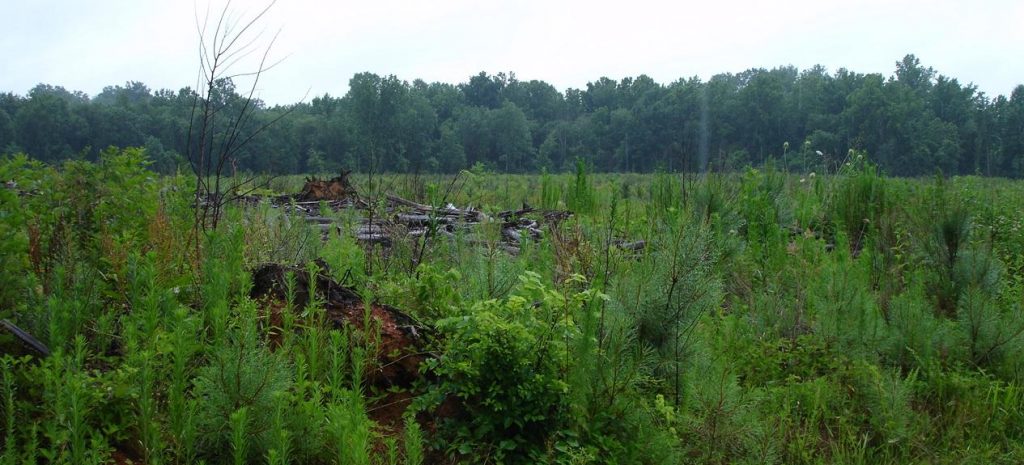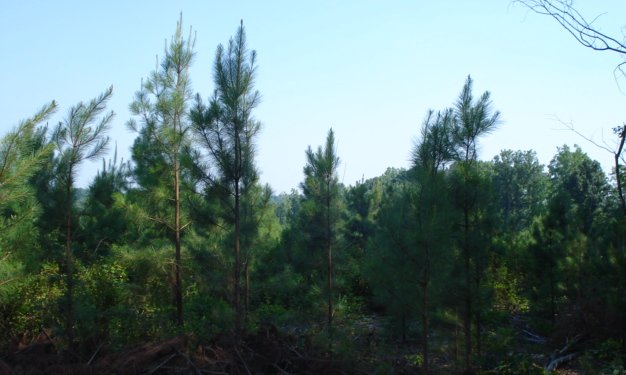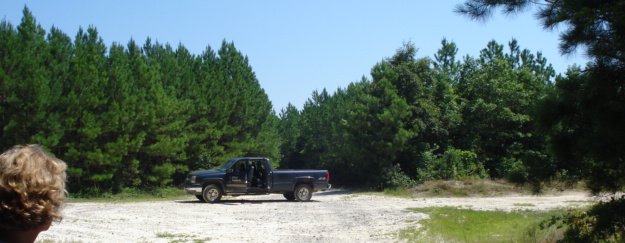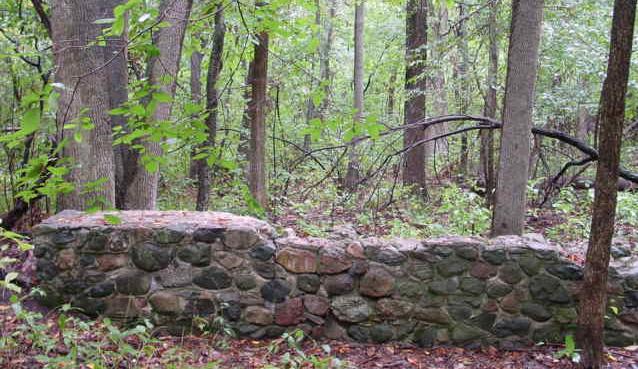Continuing my thoughts from the Greenpeace posting below, when I tell people about my forest, they often praise me for protecting nature. Their enthusiasm cools when I explain that I am indeed protecting nature by killing some animals and cutting some trees. You just cannot rely on nature to take care of itself anymore. Preservation is not desirable everywhere if you want to protect nature.
Below – the clearcut on my forest land two years later. The weeds and debris were higher than the trees and sometimes I worried whether of not I actually had a forest at all or just a weed patch.

Humans live in this world and have forever altered it. What if all humans disappeared tomorrow? What would nature “return” to? Where my trees grow, I think it would eventually be a fight between invasive paradise trees and kudzu vines. I don’t know if the wild boar would move in and tear up all the roots, but I figure that we probably would soon get many of those introduced bugs that kill beech, oak and ash trees. Eventually some sort of new balance would result. Would the paradise tree/kudzu ecosystem be superior to the pine, oak, beech & poplar and sweet gum I maintain?
Humans are not leaving this world any time soon, so my scenario above is just imaginary. Managing the land is even more important in the world we really live in.
Below – the clearcut on my land five years later

Humans must and will use resources taken from the earth. We can do that for a long time if we manage it right. A wise analysis indicates that some places should be preserved. We should not cut down all the redwoods, nor should we make the Grand Canyon into a gravel pit. But in order to be able to preserve some things, we need to use others wisely.
My land is beautiful rolling green piedmont cut into three parts by clear running streams. It is jumping with wildlife. Beavers sometimes have built little ponds. I love my land and feel responsible for it, but I am under no illusions that THIS particular land needs to be preserved untouched. It is special only to me. This was one of the early parts of our country to be colonized by English settlers. For a couple centuries what is now my land was growing crops such as corn, cotton and tobacco, which depleted the soil. About a century ago, the owners just gave up trying to grow ordinary crops and let it go. Soon loblolly pines covered the land. Those pines were harvested in the 1930s. They grew back and were harvested again in 1959, replanted with trees trees selected for their genetic qualities. These were harvested in 2003 and replanted with really superior trees, some of which are now around twelve feet high. (We never cut about 30 acres of mixed hardwood near the streams to preserve water quality.)
Below is a clearcut thirteen years later. This is on our new tree farm that we got this summer.

This land has produced wood for hundreds of homes and will produce wood for thousands more. Every stick of wood harvested from this land means we do not have to cut an old forest somewhere else. To make the trees grow faster, we apply biosolids (processed sewerage). This is where it goes when you flush the toilet. It has to go somewhere. You can dump it or bury it where it will be pollution or you can apply it to fields or forest land where it will be fertilizer for the next generation of trees.
It would be immoral for me to take this land out of production, to preserve it. My higher duty is to conserve and protect it. Conservation is harder work than preservation.
Consider the animals that live on the land. There is no shortage of deer, beaver or wild turkeys. I have seen signs of coyotes and bobcats. I am glad that the local hunters shoot and trap some of them. Each hunter gets deer during each season, gun, bow, black powder. They eat the meat and use the hides, and this pays the property taxes. They cannot seem to shoot enough deer or trap enough beaver to put a dent in their populations.
Using the current methods, I believe the land will continue to produce wood, wildlife, clean air and clear water almost forever. The land LOOKS unattractive for about three years after a clear cut, although the deer love it and it is a time of great abundance for raptors such as hawks and eagles. After three years the mix of brush and Christmas tree like forest is once again beautiful.
So remember, if you want to preserve special places, you need to use some others and if you want to protect nature, you need to cut some trees, spread some sewage and kill some animals.

Above is a wall in the middle of a woods in Wisconsin near the Milwaukee Airport. Nature returned. You would not know it had ever been gone until you come up on the wall that indicates settled agriculture in the past. Some people would call this a virgin forest, but they would be wrong. You see a lot of that in New England. I visited Robert Frost’s farm and remembered his poem “Mending Wall.” I have included it below. These days, however, there is no need to mend wall. It is the same forest on both sides. And the walls are mostly down.
Mending Wall
Something there is that doesn’t love a wall,
That sends the frozen-ground-swell under it,
And spills the upper boulders in the sun,
And makes gaps even two can pass abreast.
The work of hunters is another thing:
I have come after them and made repair
Where they have left not one stone on a stone,
But they would have the rabbit out of hiding,
To please the yelping dogs. The gaps I mean,
No one has seen them made or heard them made,
But at spring mending-time we find them there.
I let my neighbor know beyond the hill;
And on a day we meet to walk the line
And set the wall between us once again.
We keep the wall between us as we go.
To each the boulders that have fallen to each.
And some are loaves and some so nearly balls
We have to use a spell to make them balance:
‘Stay where you are until our backs are turned!’
We wear our fingers rough with handling them.
Oh, just another kind of out-door game,
One on a side. It comes to little more:
There where it is we do not need the wall:
He is all pine and I am apple orchard.
My apple trees will never get across
And eat the cones under his pines, I tell him.
He only says, ‘Good fences make good neighbors’.
Spring is the mischief in me, and I wonder
If I could put a notion in his head:
‘Why do they make good neighbors? Isn’t it
Where there are cows?
But here there are no cows.
Before I built a wall I’d ask to know
What I was walling in or walling out,
And to whom I was like to give offence.
Something there is that doesn’t love a wall,
That wants it down.’ I could say ‘Elves’ to him,
But it’s not elves exactly, and I’d rather
He said it for himself. I see him there
Bringing a stone grasped firmly by the top
In each hand, like an old-stone savage armed.
He moves in darkness as it seems to me~
Not of woods only and the shade of trees.
He will not go behind his father’s saying,
And he likes having thought of it so well
He says again, “Good fences make good neighbors.”
